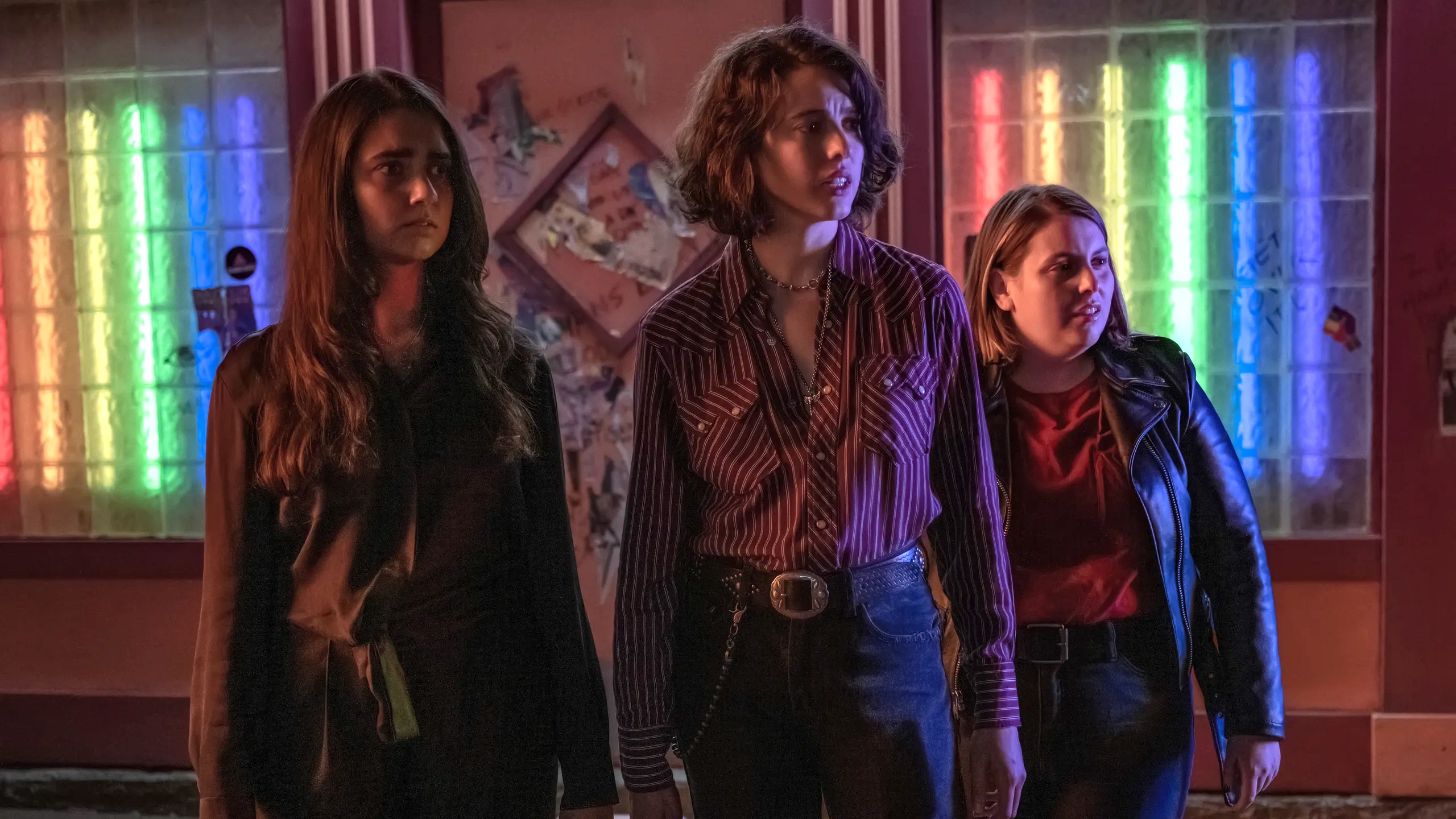Marian (Geraldine Viswanathan) and Jamie (Margaret Qualley) are lesbians in need of a change. Jamie is coming off yet another breakup, and Marian is frustrated with her job and every other aspect of her life. They have a solution that combines making money and taking a much-needed break: the pair pick up a car and drive a car from Pennsylvania down to Florida as part of a paid delivery gig. Little do they realize that the car was supposed to be taken by somebody else, and some bad news is coming their way.
The film immediately sets up expectations that this isn’t your everyday crime movie—Drive-Away Dolls is something sillier, trashier and more unexpected. It’s also completely and totally gay. It’s one of the most gleefully gay movies I can recall in recent memory. It has heightened, madcap editing that features bizarre psychedelic montages (jarring at first, though these eventually make sense) and some outstandingly corny screen wipes. There’s a lot here that feels a bit wink-wink-nudge-nudge, yet never cloying. All of the strangeness works with a story as outlandish as this one. It’s a natural fit for director Ethan Coen, working without his longtime collaborator and brother Joel for the first time (excluding Ethan’s 2022 documentary about Jerry Lee Lewis).
What was supposed to be an easy trip gets more complicated when Jamie, very much a free spirit, plans plenty of detours so she and Marian can have fun. She marks their map (the movie is set in the ’90s) with key indicators like “DYKES”—a particularly great lesbian bar, “BBQ”—for delicious food and “DIXIE CUP”—the world’s largest Dixie cup, which they simply cannot miss. The film queers the classic buddy comedy, replacing what’s usually two men with two lesbians in the vein of Thelma and Louise. Despite all the chaos (and women) that surround them, Drive-Away Dolls is very much a film about the friendship between Marian and Jamie, and Viswanathan and Qualley absolutely nail their characters’ dynamic. Coming along on their journey is so much fun, and you can never predict quite how crazy things are going to get (hint: they get completely and utterly bonkers).
What’s really surprising about Drive-Away Dolls is how much it leans into sex. Lesbians are rarely allowed to be horny on screen, particularly in mainstream cinema. Typically, lesbian characters are relegated to more reserved roles, where they engage in sexual activity only after a long-brewing romance—see Carol, Disobedience, Portrait of a Lady on Fire and Ammonite. That’s not to say there’s anything wrong with simmering longing, but there’s a distressing lack of super-horny lesbians onscreen. Progress was made with last year’s Bottoms, which followed two lesbians starting a fight club so they could hook up with cheerleaders—but in that film, they don’t actually have any sex onscreen. Drive-Away Dolls feels like a major evolution and a huge step forward for sex-forward lesbian representation in film.
Drive-Away Dolls has a lot of fun playing with this dynamic. While Jamie is hopelessly devoted to sexual conquests, Marian is considerably more reserved, and prefers reading to flirting—she spends most of the road trip reading the notoriously dense book The Europeans by Henry James. A big part of Jamie and Marian’s bonding comes from Jamie trying to get Marian laid, and discovering the joys that an active sex life can bring. It’s not just the characters that are driven by sexual desire, but the plot is too. Pretty much everything in Drive-Away Dolls links back to sex, so much so that the pair’s horniness is practically its own character.
Despite Ethan Coen working without Joel for the first time, the film feels like the kind of great screwball comedy the Coen Brothers became known for. Echoes of Burn After Reading feel resonant in Drive-Away Dolls. Coen’s wife Tricia Cooke co-wrote the film, and the two are a dynamite pair. The script is extremely funny, striking just the right balance between absurd and authentic. It’s also exceptionally queer (Cooke has defined herself as a lesbian for most of her life, and is in a “non-traditional” marriage with Coen).
The onscreen chemistry between Viswanathan and Qualley is tremendous. You understand their bond immediately, despite them being two very different people. Marian is reserved and always has her nose in a book, while Qualley is outgoing and always wants to have her nose in … well, you get the idea. The supporting cast is also wonderful: Colman Domingo, Bill Camp and Beanie Feldstein shine especially bright in their roles, as do a couple of surprise cameos that I won’t give away. Everyone cast in the film seems to be having a great time, and that energy radiates through the screen. Every second of Drive-Away Dolls is a blast. A horny, hilarious, 84-minute queer experience, this is a movie you don’t want to miss.
Drive-Away Dolls is in theatres Feb. 23.


 Why you can trust Xtra
Why you can trust Xtra


